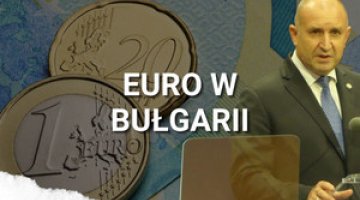Bulgaria joins the eurozone in 2026: a success for the government amid public concerns
On 8 July, the EU’s Economic and Financial Affairs Council (ECOFIN) approved Bulgaria’s accession to the eurozone, effective from 1 January 2026. Earlier reports by the European Commission and the European Central Bank confirmed that Sofia meets all convergence criteria and demonstrates stability in prices, public finances, interest rates, and the exchange rate. The greatest challenge had been addressing inflation, the 12-month average of which ultimately stood at 2.7%, just below the 2.8% threshold. Bulgaria formally began its efforts to adopt the euro in 2018, and has participated in the ERM II mechanism since 2020. Previously, in 1997, the Bulgarian lev was pegged to the German mark, and two years later to the euro. This measure successfully curbed inflation but permanently limited the country’s monetary policy instruments.
Accession to the final stage of the Economic and Monetary Union is another sign, following Bulgaria’s entry into the Schengen Area on 1 January this year, of Sofia’s deepening integration with EU structures. It marks the fulfilment of the main objective of Prime Minister Rosen Zhelyazkov’s government, which is supported by the majority of the political class. At the same time, due to widespread public reluctance towards the common currency, the issue is expected to fuel far-right parties strongly opposed to the move, as well as the sceptical President Rumen Radev.
Commentary
- By adopting the common currency, Bulgaria will symbolically crown its integration process with the EU. Since joining in 2007, the country has often been viewed as a ‘second-tier’ member state. Despite the political instability of recent years (see ‘A country of interim governments. The political crisis in Bulgaria and the attempts to solve it’), Sofia has made significant strides on the path towards deeper integration. In 2023, the European Commission ended the application of the Cooperation and Verification Mechanism (CVM), which had been in place since Bulgaria’s accession to monitor progress in judicial reform and the fight against corruption. This paved the way for the country to join the Schengen Area (together with Romania) in January this year. Meeting the convergence criteria represents a clear success for Sofia, and eurozone membership opens up new economic opportunities. At the same time, Bulgaria remains one of the poorest EU member states. It records the lowest GDP per capita measured in purchasing power parity and tops EU statistics for the proportion of the population at risk of poverty (30%).
- Joining the eurozone marks a political triumph for the Zhelyazkov cabinet. The swift adoption of the common currency was the main objective of the government formed in January this year (see ‘Bulgaria: a ‘grand coalition’ government’), and, at the same time, held together the ‘exotic’ coalition that supported it, composed of parties that had been adversaries for years. It is worth noting that these efforts were supported by the pro-European segment of the opposition, representing a rare instance of cross-party cooperation in Bulgaria’s deeply divided and fragmented parliament. However, it is to be expected that the opposition will resume criticism of the cabinet and may even attempt to bring it down in coordination with radical forces.
- Three nationalist parties – Revival, MECh, and Majesty – are firmly opposed to the adoption of the euro. They take a sovereigntist stance, viewing the lev as the last bastion of independence from the EU and a guarantor of price stability. These groups also serve as a source of misinformation regarding the consequences of introducing the common currency. They claim that the government manipulated statistical data in order to meet the convergence criteria. Currently, these parties enjoy combined support of approximately 20%, but a rise in their popularity cannot be ruled out. The radicals may gain particular traction in the early months of 2026, when a temporary increase in prices is expected following the euro’s implementation.
- Rumen Radev likewise does not support the departure from the lev within the coming year. He believes that Bulgaria should adopt the common currency in the future but argues that the country is currently not ready for this step. In an effort to assert his political agency, the president proposed holding a referendum on the matter, albeit unsuccessfully. In 2024, a similar initiative by the Revival party was rejected by the Constitutional Court, as Bulgaria had already committed to adopting the euro through its EU accession treaty. Radev’s move may be an attempt to accumulate political capital in preparation for forming his own party once his second presidential term ends in January 2027.
- According to the EU’s Eurobarometer survey, 50% of Bulgarians oppose the introduction of the common currency. Meanwhile, polling by the Trend agency shows that 38% of citizens clearly reject eurozone membership, while 33% believe it is the right direction but not advisable within the next year. At the same time, 55% state they do not feel sufficiently informed on the issue. These results reflect low public trust in the authorities and their institutions. Concerns focus primarily on a potential rise in prices and the loss of agency in international affairs. Nevertheless, the protests organised by the nationalist Revival party in defence of the lev have, to date, attracted at most a few thousand participants.





